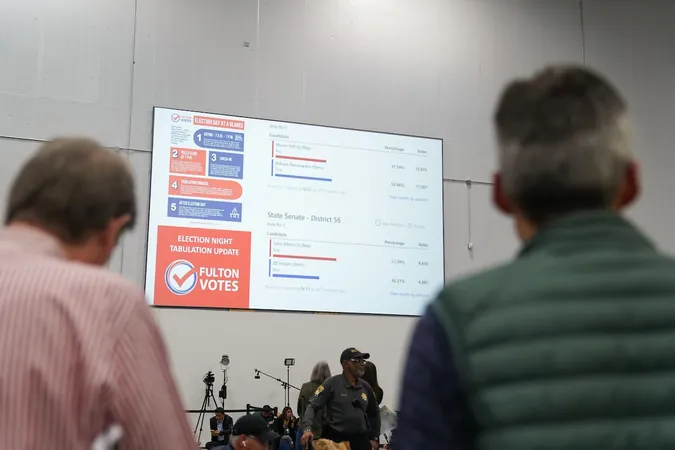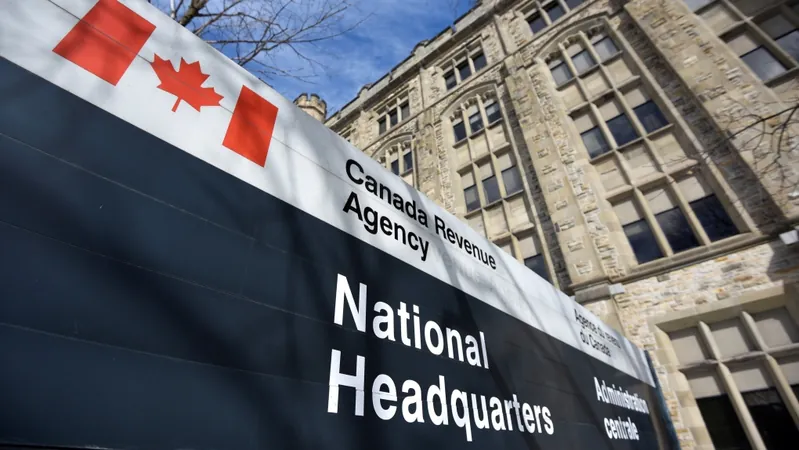
Republicans Seize Senate Seat in West Virginia, Setting the Stage for a Potential Deadlock
2024-11-06
Author: Emma
Republicans Capture Crucial Senate Seat
In a pivotal election night, Republicans managed to capture a crucial Senate seat from Democrats in West Virginia, heightening the possibility of a deadlocked Senate. This shift occurs amid a fiercely contested political landscape as both parties vie for control over Congress, a factor that could significantly influence the next president's agenda.
Stakes of the Election
The stakes were exceptionally high as the presidential election between Republican candidate Donald Trump and Democratic nominee Kamala Harris unfolded, with results too close to call late into the night. The control of the U.S. Senate and the House of Representatives will play a critical role in determining the efficacy of the incoming president's ability to fulfill their campaign promises.
Results Overview
As the night progressed, Republican Jim Justice emerged victorious over Democrat Glenn Elliott, winning the Senate seat previously held by retiring U.S. Senator Joe Manchin. Democrats entered the election with a narrow majority of 51-49. However, the balance of power in the Senate now rests at a precarious 50-50, wherein the sitting vice president can serve as a tie-breaker for significant votes.
House of Representatives Situation
The House of Representatives was also in a state of flux as early tallies showed 167 Republicans and 115 Democrats elected, with 153 races still undecided. As polls closed in several key states, political analysts closely monitored these developments, understanding that a slight shift in the number of seats could tip the scales in either direction.
Control of Congress and Presidential Administration
Control of Congress has been historically crucial for presidential administrations. Over the last decade, presidents whose parties have lacked dominance in both chambers have encountered significant challenges in advancing their legislative agendas. Before this election, the Republicans had held a slim majority in the House at 220 to 212.
Senate Seats Up for Grabs
With 34 Senate seats up for grabs, Democrats controlled 19, Republicans held 11, and four were occupied by independents. Key House races drew attention in populous states like New York and California, where major policy shifts were anticipated.
Gubernatorial Races
An additional layer of interest was added with the 11 state gubernatorial races, particularly in New Hampshire. In this race, Republican Kelly Ayotte faced Democrat Joyce Craig in a contest that was too close to call as polling indicated a tie, largely revolving around contentious abortion issues.
Notable Races
Notably, in North Carolina, Republican Mark Robinson, who aimed to be the state's first Black governor, lost to Democrat Josh Stein amidst scandal and controversy that overshadowed the campaign. Robinson faced backlash due to past remarks and online postings, even as Trump distanced himself from the candidate.
Texas saw Republican Ted Cruz secure a third term during a heated contest against Democrat Colin Allred. This race drew national attention, especially given Texas's stringent abortion laws, which Cruz had significantly influenced through judicial nominations.
In Arizona, former Democratic Senator Kyrsten Sinema's decision not to seek re-election opened the door for a high-stakes matchup between Democrat Ruben Gallego and Republican Kari Lake, both of whom have significant followings in the state.
Michigan’s Senate race, featuring Republican Mike Rogers and incumbent Democrat Elissa Slotkin, adds another layer to the competitive landscape, which also includes a tense battle in Ohio between long-time Senator Sherrod Brown and challenger Bernie Moreno.
Pennsylvania’s seasoned incumbent Bob Casey defended his position against challenger David McCormick, endorsed by Trump, emphasizing the high stakes surrounding these elections.
Historic Wins
As results continue to pour in, some candidates have already made history. Sarah McBride, a Democratic state lawmaker from Delaware, has been elected as the first openly transgender individual to Congress, marking a historic moment for representation in the legislative body.
Conclusion
With so much at play, this election cycle illustrates a significant shift in the political landscape, leaving voters and analysts eager to see how these results will shape the future of American governance.









 Brasil (PT)
Brasil (PT)
 Canada (EN)
Canada (EN)
 Chile (ES)
Chile (ES)
 España (ES)
España (ES)
 France (FR)
France (FR)
 Hong Kong (EN)
Hong Kong (EN)
 Italia (IT)
Italia (IT)
 日本 (JA)
日本 (JA)
 Magyarország (HU)
Magyarország (HU)
 Norge (NO)
Norge (NO)
 Polska (PL)
Polska (PL)
 Schweiz (DE)
Schweiz (DE)
 Singapore (EN)
Singapore (EN)
 Sverige (SV)
Sverige (SV)
 Suomi (FI)
Suomi (FI)
 Türkiye (TR)
Türkiye (TR)